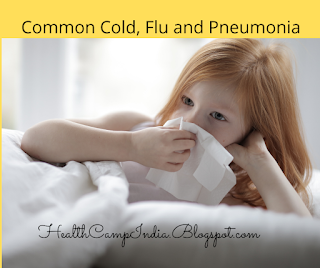Hello Readers,
Do you know the difference between COMMON COLD, FLU AND PNEUMONIA?
In this post, let us understand differences between these three symptoms and how to treat:
Pneumonia
Key Symptoms
Whilst Pneumonia may present symptoms similar to the common cold, it is in fact more sever.
Symptoms include difficulty breathing, fever, shivering or sweating, chest pain, fatigue and a dry or phlegm producing cough.
What is it ?
Caused by an infection from bacteria, viruses or fungi, which causes the lungs to become inflamed and swell up with fluid.
How long will it last and how can it be prevented?
It may take weeks to feel well again after catching Pneumonia. Even mild cases of Pneumonia can leave you with a cough that persists of two to three weeks after treatment.
Vaccination can help reduce the risk of Pneumococcal Pneumonia, the most common form of bacterial Pneumonia.
Treatment:
Mild cases can usually be treated with antibiotics, lots of rest and fluids at home. Left untreated, Pneumonia can be serious and life threatening.
FluKey Symptoms:
Tend to start more suddenly and last longer than those of the common cold and include high temperature, a headache, exhaustion and aches and pains. Symptoms tend to be more profound than a common cold.
What is it?
A common viral infection caused by the influenza virus, not caused by the same virus as a cold.
How long will it last and how cant it be prevented?
Generally lasts for around a week, however sufferers may feel tired for much longer. Unlike a cold, you can help protect yourself against flu with a flu vaccine.
Treatment
As with a cold, if you have flu you can look after yourself at home by having plenty of rest and fluids. For older children (over 16 years) and adults, over the counter cold & flu remedies can be used to relieve symptoms.
Sometimes antiviral medication can be used to reduce symptoms and aid recovery
Key Symptoms
Sore throat, blocked or runny nose, headaches, muscle aches, sneezing, a raised temperature and a cough
What is it?
A mild viral infection of the nose and throat
How long will it last and how can it be prevented?
A cold usually clears up on its own within a week or two. There is no reliable prevention of colds, but you can help stop your cold spreading to friends and family by washing your hands regularly and always using a tissue to cough or sneeze.
Treatment
Unfortunately there is no cure for a cold, it is recommended to rest and drink plenty of fluids.
For children over 6 years old and adults, over the counter cold remedies can be used to relieve symptoms
Thank you for reading
source:Pfizer




